Our Travel philosophy
- With our trekking and trekking with homestay offers, Akabar – Sahara Treks want to provide an income for the people in the desert so that they can continue to live in their environment and culture and are not forced to migrate to cities. For the trekking tours we employ friendly nomads from the Jebel Bani Mountains with their own camels. In this way, the chameliers can contribute to the upkeep of their families with their own animals. In order to also offer single female nomads or female nomads in need an income opportunity, these may accompany women’s groups as cook.
- Hafid Benyachou attaches great importance to quality, be it in the food, the equipment, the nomad team and the choice of route and camp sites.
- Our tours and hikes are carried out in close cooperation with nomads from the Ait Atta tribe, who do not simply work for us. We value community and a family-like, friendly relationship where we learn a lot about their culture and daily life while getting to know their living environment in the desert.
- At Akabar – Sahara Treks, it is customary for guests and team to eat meals largely together and to travel like one big family. The Akabar team is always concerned about the well-being of the guests and takes care and responsibility of their duties before and during the tour. Escorts and trekking guests walk together during the tour and the escorts are not forbidden to talk to the guests. Only in this way can cultural exchange and mutual understanding take place.
- Akabar – Sahara Treks employs only local people, that is nomads and semi-nomads as chameliers, cook and helpers as well as the jeep drivers from Zagora. Food comes from the market in Zagora and selected local traders. We work together with some small cosy riads located two km outside of Zagora in the oasis gardens of Amezrou.
- The camels of our companions are treated well and with respect. The nomads consider their animals as family members. Their camels are not kept in stables but roam the valleys of Jebel Bani and the dune foothills. On the tours they carry the luggage for a maximum of five to six hours, the rest of the time they are foraging and resting. In the mornings and evenings, especially in dry weather, they are given date meal and oats. The number of camels depends on the size of the group, so that the animals do not have to carry too much.
- Our trekking tours lead away from mass tourism on former caravan paths and shepherds‘ hiking routes through the varied and fascinating stone wilderness of Jebel Bani, through dune landscapes, over hamadas and to oases. We have chosen our routes so that we walk off the beaten track of common caravan routes and jeep tracks. Our team is at home in mountains and desert. The valleys and plains of the vast Jebel Bani mountain range are part of the grazing areas of the herds of our nomadic companions. On our caravans with spontaneous overnight stays with nomadic families, you will experience the life and culture of the nomadic population of the Sahara.
- Our desert walks are offered without fixed daily tour descriptions, as this does not correspond to nomadic life. A desert walk and stay with nomads is very simple, without any comfort. On the other hand, the traveller is rewarded by the warmth, openness and spontaneity of the desert dwellers. For this reason, we expect our guests to be tolerant and flexible, as well as willing to fit into the community and to take on tasks such as collecting wood, fetching water and cleaning up. We want to leave the desert clean and without big traces on our hikes, therefore combustible waste is burnt and other rubbish is taken back to Zagora and disposed of there. It is very important to us to carry out cautious and sustainable tourism in order not to negatively influence the existing structures and the culture of the nomads.
- In extreme landscapes such as the desert, it is possible to deviate from the described itinerary due to weather conditions; therefore, we also expect a certain degree of flexibility and adaptability from the participants. On our tours in the Sahara we get to know the daily hard living conditions of the desert inhabitants, who have to live with sandstorms, heat, sudden rainfalls or years of drought.
Our offers are closely calculated, food, wages and transfer costs are current prices in Morocco. For this reason it is not possible for us to give discounts, because otherwise the anyway low income would be reduced thereby.
Hafid Benyachou and the nomads team
The team
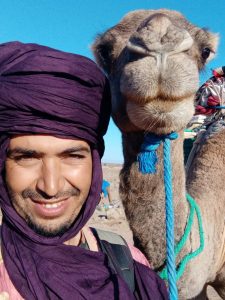
Hafid Benyachou, certified trekking guide and tour leader from Zagora is responsible for organising and accompanying trekking, homestay and round trips. He comes from a nomadic family of the Ait Atta tribe, studied teaching in Agadir after graduating from high school and taught children and young people at the nomadic school in Tafraout for several years. He is the nomads‘ advisor and actively supports them in asserting their interests outside the desert. Together with the nomads of Tafraout, he founded the association „Association Akabar for Sustainable Development and Culture“. He is also the contact person and translator for the Italian organisation Il Mondo Incantato (founder and sponsor of the nomad school) and for the „Engineers without Borders“ (see aid projects for nomads). Hafid has many years of trekking experience as a guide for his brother’s company. On 01 August 2014, the registration of his trekking company Akabar – Sahara Treks took place. Hafid visited Germany for the first time in 2013 and during his stay he visited, among others, the organisation „Engineers without Borders“, in Berlin and described the water situation of the high valley of Tafraout. In November 2014, members of „Engineers without Borders“ were in the Tafraout Valley and, with the support of Hafid and the nomad association Akabar, examined almost all the wells in the valley. For more details, see „Nomad Aid“.
The trekking companions:
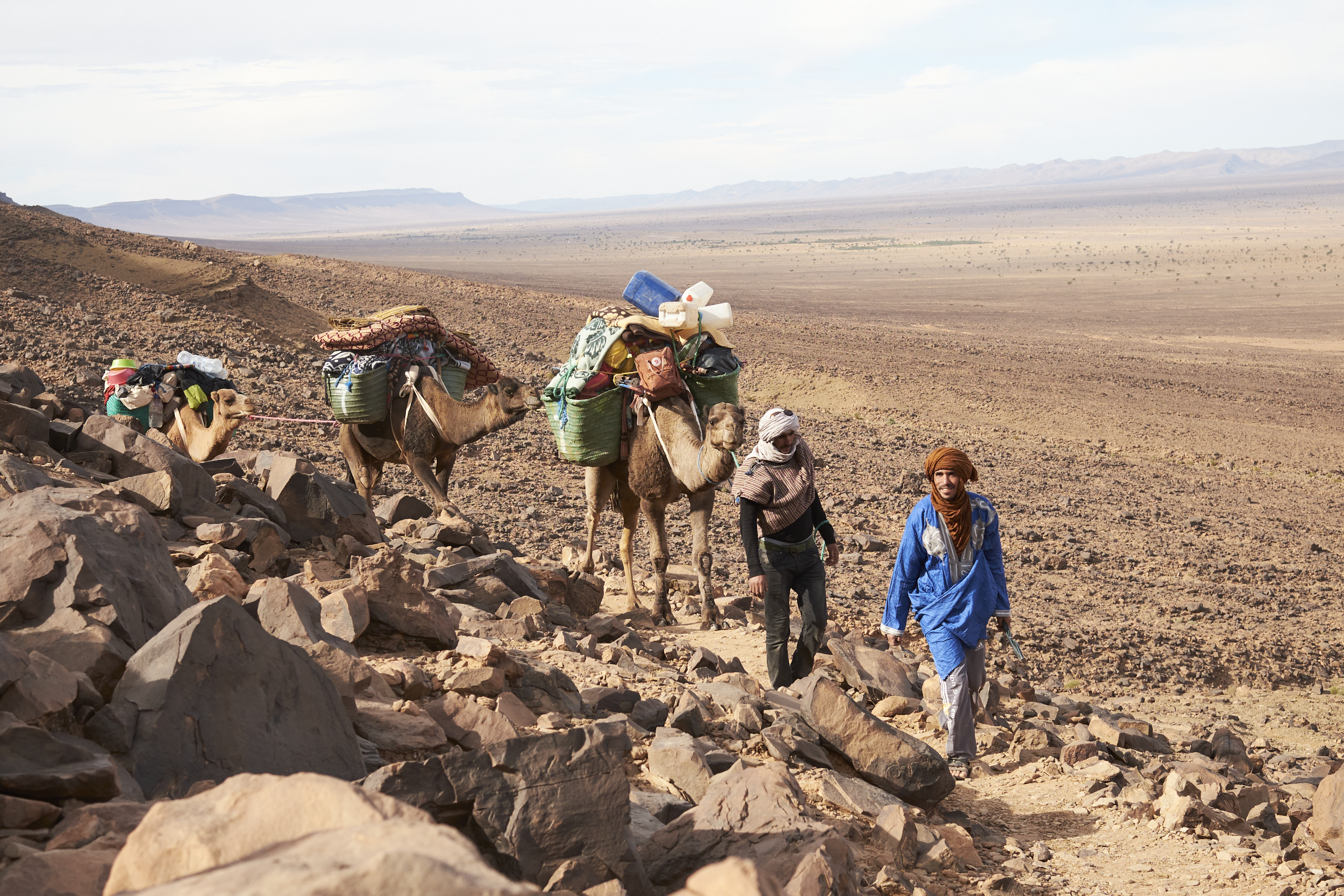
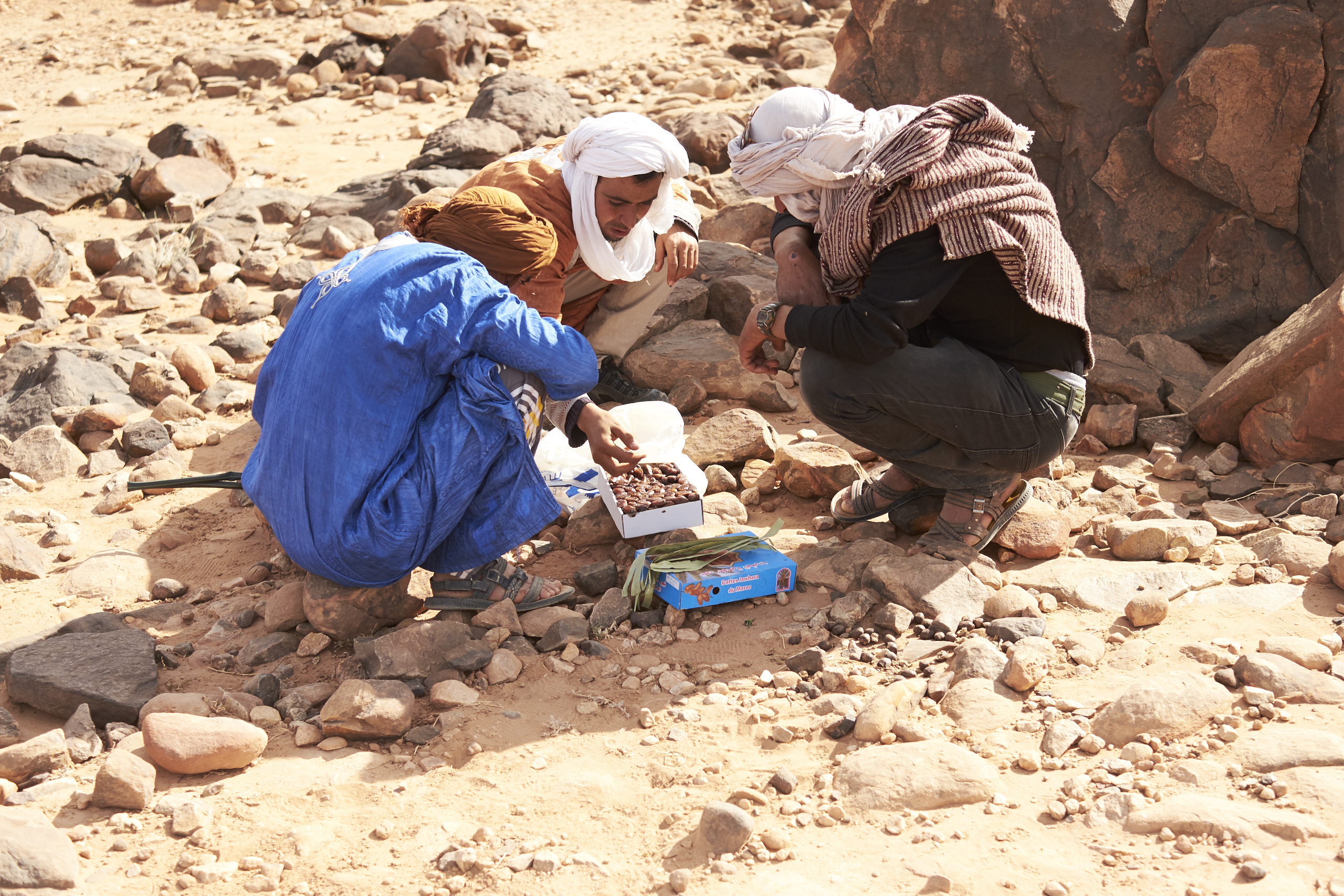
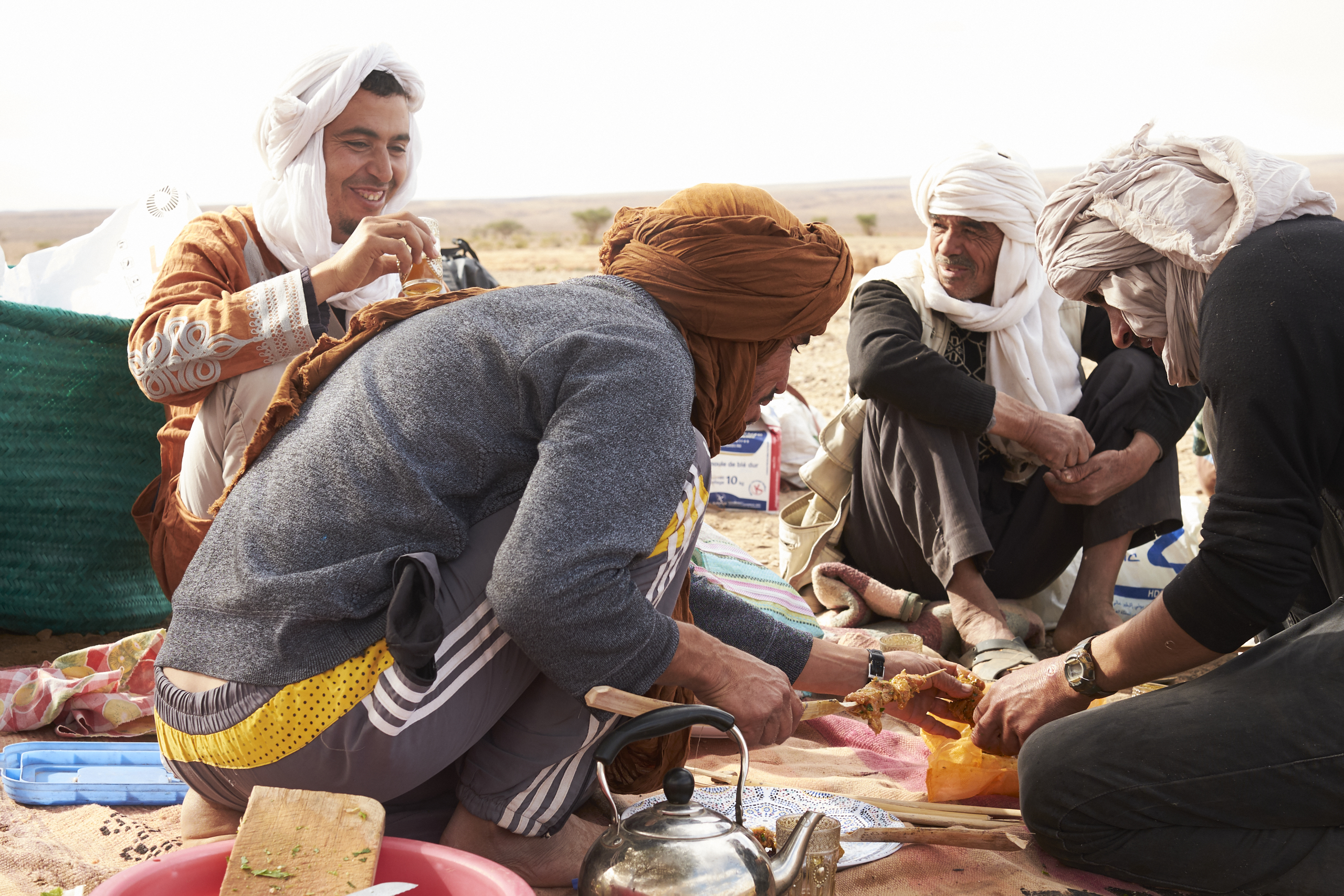
Lahsen Rabouze, older brother of Yusuf, is our cook. From breakfast to dinner he conjures delicious Moroccan cuisine on the „table“:

Mohammed Oukhayi is nomad, chamelier and a great cook. He guides especially our very small groups like single travellers and couples. Mohamed can read from your face. He is responsible for the camels; for the treks he takes the camels of various nomadic families of Jebel Bani and Boujah area, who thus have an income.
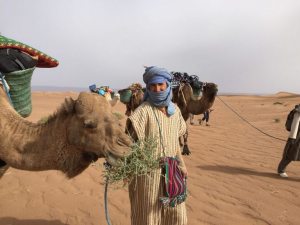
Ydir Oukhayi is Mohamed’s older brother and responsible for guiding and camels. And like his borther also a great cook; his plain breads baked in sand or on hot stones are very delicious.
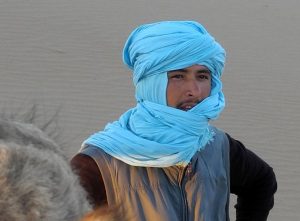
Yusuf Rabouze is our experienced junior guide and also chamelier. He is from a nomad family who lived with it’s herd until last year in Jebel Bani mountains, yet moved near Tafraout village. Yusuf is about 25 years old, went to the nomad school of Tafraout, thus speaks a little English. He is always very happy to accompany interested travellers on their trekking tour. He knows the desert – mountains and dunes – by heart

Yusuf Karmoud is chamelier/nomad from a hidden valley in the Jebel Bani range; some of our treks are passing his grounds.
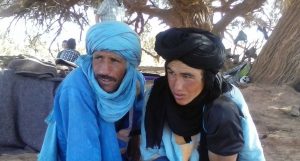
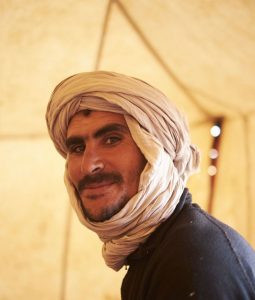
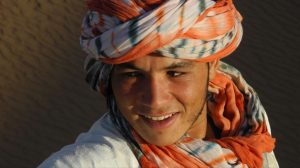
Hussain Maskou is chamelier/nomad from the Jebel Bani area

Tawda and other Berber women may accompany women groups
Responsible for the website and trekking advice

My name is Monika Boch-Jacuk, M.Sc. (GB) International Business, and since 2012 I have been responsible for maintaining the website and travel advice with the support of my husband. Since my first desert trek in 2009 in Tunisia I have been addicted to the desert and so I have done almost 20 trekking tours in deserts (Tunisia, Morocco, Oman, Mongolia, Algeria and Mauritania). After my first trekking tour in 2011, Hafid enabled me to teach English to young people at the old nomad school in Tafraout/Jebel Bani. Since then, together with Hafid, I have been trying to help young people earn an income by offering trekking support.
By chance, I came across the commitment of the organisation „Engineers without Borders“ and since families were already leaving the valley of Tafraout in the summer of 2012 due to wells running dry, I asked „Engineers without Borders“ for possible help. In November 2014, two teams of the „Engineers“ examined the water supply situation in the Tafraout area and until 2016, various projects were carried out.
I am voluntary engaged for the people of Sahara and in supporting business of „Akabar – Sahara treks“; thus no extra costs from Germany are included in our prices.
